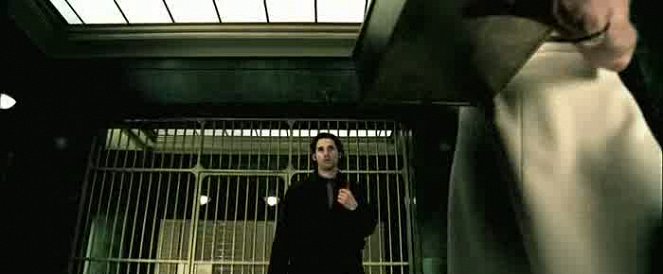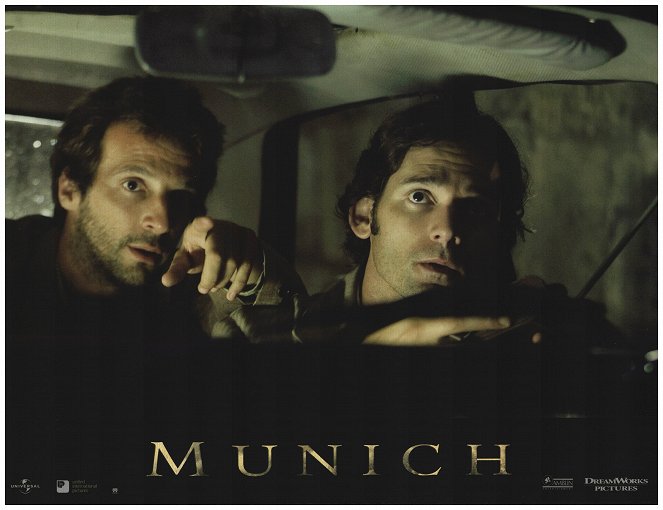Réalisation:
Steven SpielbergPhotographie:
Janusz KaminskiMusique:
John WilliamsActeurs·trices:
Eric Bana, Daniel Craig, Ciarán Hinds, Mathieu Kassovitz, Hanns Zischler, Ayelet Zurer, Geoffrey Rush, Gila Almagor, Michael Lonsdale (plus)VOD (3)
Résumés(1)
A Munich, en 1972, des terroristes palestiniens prennent en otages des athlètes israéliens. L'opération tourne au carnage. Avner, agent du Mossad, reçoit l'ordre de retrouver et d'éliminer les commanditaires de l'attentat. Il change d'identité et quitte Tel Aviv avec un commando de quatre hommes... (FilmoTV)
Vidéo (1)
Critiques (12)
Très discutable 4*. Malheureusement, Spielberg a atteint la maturité et l'aspect émotionnel et la froideur académique, qui pouvaient être pardonnés dans son film "La guerre des mondes", ne peuvent pas être pardonnés dans "Munich". En effet, "La guerre des mondes" fonctionnait parfaitement comme un pur film d'horreur, avec des aspects techniques qui faisaient frissonner. "Munich" essaie de traiter des sujets sérieux de manière spirituelle, ce à quoi la précision technique ne suffit pas. Ainsi, le seul élément qui fonctionne réellement dans tout ce film long et fastidieux, ce sont les meurtres froids et naturalistes, notamment celui de la jeune assassin sur le bateau. Quelqu'un pourrait argumenter que "Munich" ne m'a pas touché parce que le conflit entre musulmans et juifs ne me concerne pas, mais je ne suis même pas juif et "La liste de Schindler" est dans mon top 10 des films préférés. Parce qu'il a le cœur gros comme un éléphant.
()
J’étais très enthousiaste à l’idée de voir Munich, mais je me suis royalement mépris. Mon excitation était due aux bandes-annonces prometteuses au cinéma, mais, en fin de compte, c’était décevant.
()
"Israel has lost her son" some Israeli leaders bitterly declared about Spielberg. What got them so riled up? Although Munich is first and foremost a suspenseful spy thriller, Spielberg is no longer just someone who has E.T. saying "Go home" and Indy wielding his whip for the audience's pleasure, now he also wants to comment on the world's ills, both historical (Schindler's List) and current ones, such as the pressing Israeli-Palestinian issue. When he says through the character of Robert: “All of this blood comes back to us,” or when Avner, in Eric Bana's convincing performance, says “Did we accomplish anything at all? Every man we killed has been replaced by worse. There's no peace at the end of this no matter what you believe.", perhaps this is Spielberg voicing his own opinion, and I believe this was hard for Israeli leaders to listen to (but to be clear, I'm on their side). Politics aside, what's left? Above all, a masterfully directed thriller that captivates with perfect filmmaking (I would highlight the precise set design with a perfect 70s atmosphere), is free of pathos, which has always been a sore point of Spielberg's serious films, and in several scenes proves that this overgrown child can shock properly (I don’t think I’ll forget the harsh naturalistic scene of the killing the Dutch murderess). Munich may not have as deep an emotional impact as Schindler's List or Amistad, but it is a piece of attractive, honest filmmaking that wants to say something, and it says that something in a highly attractive way. To miss it would be a mistake.
()
I was awaiting Steven Spielberg's Munich with considerable tension. Not only because of the fact that the classic of American cinema showed, with his latest film War of the Worlds, that he can brilliantly comprehend, say, trashy themes. I eagerly awaited how the Jew Spielberg was going to deal with such a burning and painful question as Israel's relationship to terrorism. I'm not disappointed. On the contrary. I'm taken aback and emotionally overwhelmed. The scope of Munich is a typical representative of Hollywood in recent years - the massive runtime amounts to weaker spots, polyglots, loss of pace. Nevertheless, a filmmaker of Spielberg's extra class can reasonably balance adrenaline and an idea without one or the other suffering too much. Munich thus alternates adrenaline sequences of individual hired killers with calm meditative sections, in which the heroes reflect on ethics, law and justice. The alternation of the two passages is sometimes captivating (that is, when the idea blends into the action sequence, as is the case, for example, with the action in Athens), whilst sometimes the "ethical" sections seem too sweeping and lose their inner tension. It is extremely commendable that Spielberg avoided, as much as possible, a clear answer to the burning question of "who is to blame?" His only answer is the hero Evram in an absolutely captivating performance (I dare say) by actor Eric Bana. In it, all the ambiguity of justice and the question of morality are connected in the captivating dilemma of a man who, in an effort to protect his home, loses it, together with his identity and his Judaism. The illusion of just retribution turns into a futile hunt for some higher right of revenge, into a growing list of the dead on both sides, and into a mental black hole in which everything one leans on disappears. If you are waiting for a reconstruction of the Munich events, you will be disappointed. The script artfully decomposes the tragedy into a passing story – from the initial acquaintance through period reports to the captivating and devastating finale, which we see as if through Evram's eyes. Munich contains several strong moments that aroused in me unexpected eruptions of emotions (Evram, who hears his daughter's voice for the first time, a love scene intertwined with the massacre of hostages). The film also contains several moments, that seem to be excessive, when the narrative concentration becomes a bit distracting. However, as a whole, the film is extremely consistent, even in terms of ideas, which do their best not to categorize and to avoid stereotypes. Munich is a very impressive and powerful film. In one real event, it reflects all the perversion and absurdity of one of the worst crises of humanity today. The most valuable part of the film, however, is the personal story of Evram, in which everything important is immediately reflected. I also have to point out the excellent soundtrack by John Williams, the excellent camera of Janusz Kamiński and the surprisingly good Daniel Craig. Once again, I need to emphasize Steven Spielberg, who perfectly blends craftsmanship with the confidence of a filmmaker who knows what he wants to say.
()
(moins)
(plus)
Brilliant craftsmanship without a drop of emotion. The combination of such a serious subject with this director promised an emotionally charged spectacle, and yet I witnessed a disproportionately drawn-out revenge spectacle. And while it was supposed to be cold-blooded, not a single scene managed to appeal to me. Spielberg wanted to make a "political espionage" thriller that would cut through the drama with interpersonal relationships, from which the lesson was supposed to be that "violence only breeds more violence." The film contains both, but neither component works as it should. Spielberg did not restrain himself and through the excessive runtime, he tries to create a moral agitprop not only for the Jews but for all people. And yet the skeleton of the story falls apart and the viewer only gets the impression of wholeness in the purges of the Palestinian terrorists, which are just pure craft, nothing more. That actually brings me back to the beginning of my commentary.
()



Annonces